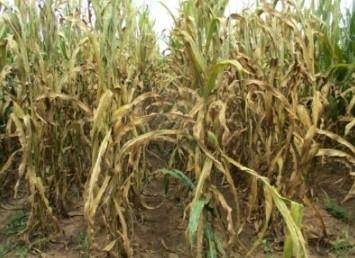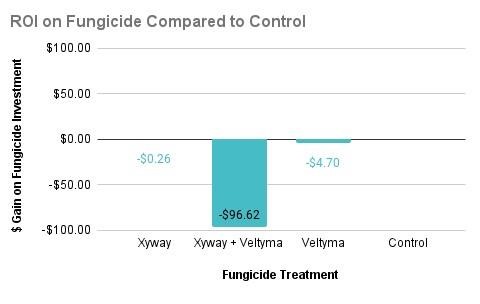Grain Corn Trial: The grain corn trial was conducted by Agents Heather Schronce and Jenny Carleo. AgriGold A646-12VT2PRIB was planted on April 14, 2021, at 28,000 seeds per acre at ASR Grain in Shelby, NC. All treatments received 15 gallons of 32% UAN (53 units of N) via 2×2 at planting. The Xyway treatment was tank-mixed with the 2×2 starter fertilizer. Treatments were replicated 3 times (2 replicates were used in the data analysis). Commercial planting, spraying, and harvesting equipment was used throughout the study. The Veltyma treatment was applied at V10 on June 18, 2021, at 7oz/A. Harvest was on September 7, 2021. Grain weights for each plot were taken with the NC State weigh wagon accurate to 2 lbs. This season was very dry during critical periods of corn development which visibly reduced yield and increased plant stress. Grey Leaf Spot, Northern Corn Leaf Blight, and Southern Corn Leaf Blight incidence was minimal.
Germination Results: Stand counts were performed on May 12, 2021. The Xyway plots had 1.8% more plants germinated than the other plots. There was no distortion or stunting of plants in this 2×2 study in the Xyway plots. The increase in number of plants per square foot did not result in a yield benefit.
Yield Results: Average yield for this field was 134 bu/A, 56.2 lbs./bu test weight and 17.3% moisture. Applications of Xyway or Veltyma did not increase yield.

Crop Income: This graph shows the dollar amount of corn sold per acre at $4 per bushel for each of the treatments.

Return on Investment (ROI): The formula used to calculate ROI = [(Yield x $4/bu) – Cost of Fungicide]

There was no financial benefit of applying fungicides to corn in this trial in 2021. The cost of the fungicides exceeded the yield benefit of applying them. In our trial the Xyway + Veltyma treatment brought $96.62 less income than the control. This is because yield was reduced, and, expenses were higher, since two fungicides were applied instead of just one or none.
2021 was a year with low disease pressure for grain crops. This project should be repeated in a year with high disease pressure to reveal differences between treatments under those circumstances. Many thanks to the farmers and employees at ASR Grain in Shelby, NC for the research concept and work they did on this project with us.
FMC donated the Xyway product and paid for the silage analysis. All research tasks and data collection were performed exclusively by NC State University and N.C. Department of Agriculture and Services employees.
Source : ncsu.edu